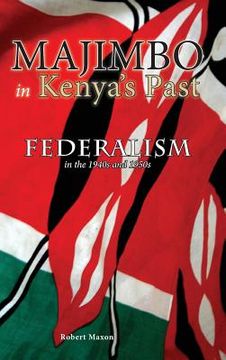Reseña del libro "Majimbo in Kenya's Past: Federalism in the 1940s and 1950s (en Inglés)"
Advocacy for federalism in Kenya emerged amidst World War II and its aftermath. The rapidly changing political, economic, and social environment in Great Britain and British colonies in Africa formed the background for uncertainty and concern for the future among Kenya's European settler minority. Federalism's appeal came forth among a portion of the European community and some of the colonial rulers who were concerned about a post-war world that seemed certain to bring far reaching changes in Britain's most important East African dependency. These included democratization, the extension of civil liberties, increased economic opportunities for the African majority, and social integration leading to eventual decolonization. European anxiety as to the impact of such changes on their privileged political, economic and social status produced advocacy for majimbo or a federal system of governance between 1940 and 1960.This advocacy for federalism emerged in a colonial political system defined by a racially differentiated electorate with separate representative systems and voting by racially defined groups. The European minority in Kenya enjoyed pride of place in 1945, but demands for greater political participation from the larger Asian and African communities and the British government's support for a sharing of power among Kenya's racial group placed Kenya's Europeans on the defensive. The declaration of a state of Emergency in Kenya in October 1952 and the outbreak of the Mau Mau war/rebellion added to European concerns and uncertainties that provided powerful fuel for federalist ideas throughout the rest of the decade. For example, the political reforms pushed by the British government and the colonial state in response to the war/rebellion provoked enhanced calls for federalism among the vocal minority among the European community.Federalism remains a controversial topic in Kenyan history and in contemporary Kenya. In the current century, federal advocacy has been viewed by scholars and public as responsible for outbreaks of pre- and post-election violence. The movers and motives of federal advocates is also a subject that provokes strong opinions as they have often been viewed as racists or tribalists. It is thus important to examine and analyze the movers of majimbo, their motives, the shape and substance of their schemes, and the reasons for their lack of success in moving late colonial Kenya to adopt a federal system. This book demonstrates that the decade of the 1950s was the high water point for federalism in Kenyan history. Finally, it is critical to closely review that decade's federalist advocacy in light of Kenya's adoption of a federal scheme of governance with the 2010 constitution.This is the first detailed study of federalism in Kenya during the 1940s and 1950s that provides important grounding and background for the understanding of the later emergence of majimbo in the independence era (1961-1963) and later. The book identifies the movers of federalism during the period of study as well as providing in-depth analysis of the political parties they used to promote provincial autonomy and evolution plans. These include the Federal Independence Party, the Progressive Local Government Party, and the United Party. The analysis reveals that the movers backed majimbo as a defensive mechanism. They hoped it would serve as a means of protecting and perpetuating white privilege in terms of political dominance, segregated schools and public facilities, and, most of all, exclusive European control of a large portion of the colony's productive farm land, the white highlands.Majimbo in Kenya's Past is an important book for African studies, history, and politics.

